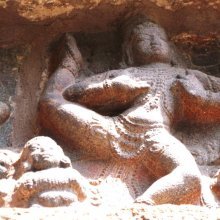Shank, Śaṅk: 7 definitions
Introduction:
Shank means something in Hinduism, Sanskrit. If you want to know the exact meaning, history, etymology or English translation of this term then check out the descriptions on this page. Add your comment or reference to a book if you want to contribute to this summary article.
The Sanskrit term Śaṅk can be transliterated into English as Sank or Shank, using the IAST transliteration scheme (?).
Images (photo gallery)
(+5 more images available)
In Hinduism
Yoga (school of philosophy)
Source: ORA: Amanaska (king of all yogas): A Critical Edition and Annotated Translation by Jason BirchThe Shanks are denoted by the Sanskrit term Jaṅghā, according to the Mataṅgapārameśvaratantra (Mataṅgapārameśvara’s Yogapāda) verse 2.23-27.—In later Tantras, various details [such as fixing the eyes on some object] often preceded the verses on the seated postures, thereby indicating that the position of the hands, torso and gaze was ancillary to all of the prescribed postures. In the Mataṅgapārameśvara, these postural ancillaries [making use of the Shanks] constitute what they call a karaṇa, and when it is combined with a seated pose, the Yogin’s posture becomes just as complicated as any seated pose described in later medieval yoga texts.

Yoga is originally considered a branch of Hindu philosophy (astika), but both ancient and modern Yoga combine the physical, mental and spiritual. Yoga teaches various physical techniques also known as āsanas (postures), used for various purposes (eg., meditation, contemplation, relaxation).
Languages of India and abroad
Sanskrit dictionary
Source: DDSA: The practical Sanskrit-English dictionaryŚaṅk (शङ्क्).—1 Ā. (śaṅkate, śaṅkita)
1) To doubt, be uncertain, hesitate, be doubtful; शङ्के जीवति वा न वा (śaṅke jīvati vā na vā) Rām.
2) To dread, fear, be afraid (with abl.); नाशङ्किष्ट विवस्वतः (nāśaṅkiṣṭa vivasvataḥ) Bhaṭṭikāvya 15.39; अशङ्कितेभ्यः शङ्केत शङ्कितेभ्यश्च सर्वतः (aśaṅkitebhyaḥ śaṅketa śaṅkitebhyaśca sarvataḥ) Subhāṣ.
3) To suspect, mistrust, distrust; स्वैर्दोषैर्भवति हि शङ्कितो मनुष्यः (svairdoṣairbhavati hi śaṅkito manuṣyaḥ) Mṛcchakaṭika 4.2.
4) To think, believe, fancy, imagine, think probable, suspect, fear; त्वय्यासन्ने नयन- मुपरिस्पन्दि शङ्के मृगाक्ष्याः (tvayyāsanne nayana- muparispandi śaṅke mṛgākṣyāḥ) Meghadūta 97; नाहं पुनस्तथा त्वयि यथा हि मां शङ्कसे भीरु (nāhaṃ punastathā tvayi yathā hi māṃ śaṅkase bhīru) V.3.14; Bhaṭṭikāvya 3.26; N.22.42.
5) To start an objection, raise a doubt or objection (about); अत्रेदं शङ्क्यते (atredaṃ śaṅkyate) (often used in controversial language); न च ब्रह्मणः प्रमाणान्तरगम्यत्वं शङ्कितुं शक्यम् (na ca brahmaṇaḥ pramāṇāntaragamyatvaṃ śaṅkituṃ śakyam) Sarva S. -Caus. To frighten, terrify.
Source: Cologne Digital Sanskrit Dictionaries: Benfey Sanskrit-English DictionaryŚaṅk (शङ्क्).—i. 1, [Ātmanepada.] (in epic poetry also [Parasmaipada.], [Rāmāyaṇa] 2, 90, 15), 1. To hesitate, to be uncertain, [Rāmāyaṇa] 3, 49, 16. 2. To doubt, Mahābhārata 3, 16512. 3. To think probable, to believe, Mahābhārata 4, 97; to think, [Vikramorvaśī, (ed. Bollensen.)] [distich] 55. 4. To distrust, to suspect, Mahābhārata 3, 2327. 5. To fear, [Vikramorvaśī, (ed. Bollensen.)] 66, 10; Mahābhārata 3, 2274. Ptcple. of the pf. pass. śaṅkita. 1. Suspicious, [Pañcatantra] 187, 4; alarmed, frightened, [Rāmāyaṇa] 3, 52, 48. 2. Being fearful of (with gen. and abl.), [Pañcatantra] 100, 9. 3. Doubtful, uncertain. 4. Weak. unsteadv. Comp. Nitya-, adj. constantly suspicious, [Hitopadeśa] i. [distich] 24, M. M. [Causal.] To frighten, [Mālavikāgnimitra, (ed. Tullberg.)] 44, 13.
— With the prep. ati ati, 1. To suspect, Rām, 2, 52, 57. 2. To fear, [Rāmāyaṇa] 2, 22, 30.
— With abhi abhi, 1. To be uncertain, [Mānavadharmaśāstra] 8, 96. 2. To doubt, [Matsyopākhyāna] 34. abhiśaṅkita, 1. Suspecting,
— With ā ā, 1. To hesitate, [Pañcatantra] i. [distich] 437 (with ptcple. in the sense of an infin.). 2. To doubt. [Śākuntala, (ed. Böhtlingk.)] 66, 19. 3. To think probable, Da- śak. in
— With nis nis, niḥśaṅkita (rather śaṅkita with nis), 1. Not hesitating, [Pañcatantra] 217, 12. 2. Careless, ib. 161, 16.
— With pari pari, To suspect, Mahābhārata 3, 10356; with doṣeṇa, a crime or sin, [Nala] 24, 26. pariśaṅkita, 1. Suspected,
— With vi vi, 1. To doubt, Mahābhārata 1, 2966. 2. To suspect, [Śākuntala, (ed. Böhtlingk.)] [distich] 114. 3. To fear, [Mālatīmādhava, (ed. Calc.)] 70, 13; [Pañcatantra] ii. [distich] 178. a-viśaṅkita, adj. Fearless, [Vikramorvaśī, (ed. Bollensen.)] 81, 11.
— With nirvi nis-vi, nirviśaṅkita (rather vi- śaṅkita with nis), acc. ºtam, adv. Without hesitation, [Harivaṃśa, (ed. Calc.)] 7335.
— With sam sam, To suspect, Mahābhārata 4, 568.
— Cf. [Latin] cunc + tari; [Anglo-Saxon.] hangian; [Gothic.] and [Old High German.] hugjan; [Gothic.] hugs; [Anglo-Saxon.] hige, hyge, hogu, hygian, hyggan, hiegan, hogian; [Old High German.] hugu.
Source: Cologne Digital Sanskrit Dictionaries: Cappeller Sanskrit-English DictionaryŚaṅk (शङ्क्).—śaṅkate (śaṅkati), [participle] śaṅkita (q.v.) doubt, hesitate, be anxious or suspicious, be afraid of ([accusative] or [ablative]); suppose, expect, believe. [Causative] śaṅkayati make anxious about ([locative]).
Source: Cologne Digital Sanskrit Dictionaries: Monier-Williams Sanskrit-English DictionaryŚaṅk (शङ्क्):—[class] 1. [Ātmanepada] ([Dhātupāṭha iv, 12]) śaṅkate ([Epic] also [Parasmaipada]; [Aorist] 2. sg. aśaṅkīs, aśaṅkiṣṭa, śaṅkiṣṭhās, śaṅkithās, [Mahābhārata] etc. [infinitive mood] śaṅkitum, [ib.]; [indeclinable participle]; -śaṅkya, [ib.]; [grammar] also [perfect tense] śaśaṅke [future] śaṅkitā, śaṅkiṣyate),
—to be anxious or apprehensive, be afraid of ([ablative]), fear, dread, suspect, distrust ([accusative]), [Brāhmaṇa; Mahābhārata];
—to be in doubt or uncertain about ([accusative]), hesitate, [Mahābhārata; Kāvya literature] etc.;
—to think probable, assume, believe, regard as (with two [accusative]), suppose to be (śaṅke, ‘I think’, ‘I suppose’, ‘it seems to me’), [ib.];
— (in argumentative works) to ponder over or propound a doubt or objection:—[Passive voice] śaṅkyate ([Aorist] aśaṅki), to be feared or doubted etc.:—[Causal] śaṅkayati, to cause to fear or doubt, render anxious about ([locative case]), [Mālavikāgnimitra]
Source: DDSA: Paia-sadda-mahannavo; a comprehensive Prakrit Hindi dictionary (S)Śaṅk (शङ्क्) in the Sanskrit language is related to the Prakrit word: Saṃka.
[Sanskrit to German]
Sanskrit, also spelled संस्कृतम् (saṃskṛtam), is an ancient language of India commonly seen as the grandmother of the Indo-European language family (even English!). Closely allied with Prakrit and Pali, Sanskrit is more exhaustive in both grammar and terms and has the most extensive collection of literature in the world, greatly surpassing its sister-languages Greek and Latin.
See also (Relevant definitions)
Starts with (+496): Samkhya, Samkoca, Sankala, Sankara-dhana, Sankara-kuta, Sankara-thana, Sankaran, Sankata, Sankava, Sankhala, Sankhalika, Sankhapa, Sanki, Sankila, Sankin, Sankoci, Sankucchaya, Sankuchchhaya, Sankuci, Sankula.
Ends with: Abhishank, Anshank, Ashank, Atishank, Nishshank, Parishank, Pratishank, Red shank, Redshank, Sashank, Shashank, Upashank, Vishank, Visheshank.
Full-text (+273): Jangha, Abhishanka, Parisanka, Shankura, Shanka, Kshipta, Asanka, Upashank, Atishank, Urdhvajanu, Visankita, Nalakuti, Parishankin, Nalaguti, Parivritta, Vishankin, Osidi, Visidi, Ogacchi, Sidi.
Relevant text
Search found 90 books and stories containing Shank, Śaṅk, Sank; (plurals include: Shanks, Śaṅks, Sanks). You can also click to the full overview containing English textual excerpts. Below are direct links for the most relevant articles:
Natyashastra (English) (by Bharata-muni)
Yoga-sutras (with Vyasa and Vachaspati Mishra) (by Rama Prasada)
Sūtra 2.46 < [Book 2 - Practice (Sādhana)]
Sūtra 3.1 < [Book 3 - Attainment (Vibhūti or Siddhi)]
Gati in Theory and Practice (by Dr. Sujatha Mohan)
Performance of Cārī < [Chapter 2 - Concept and technique of Gati]
Elements of Āṅgika-abhinaya in Nāṭyaśāstra < [Chapter 1 - Nāṭya]
Gaits according to characters < [Chapter 2 - Concept and technique of Gati]
The Agni Purana (by N. Gangadharan)
Chapter 59 - Preliminary consecration of an image (adhivāsana)
Chapter 380 - Knowledge of non-dual Brahman (advaita-brahma-vijñāna)
Chapter 25 - Worship regarding Vāsudeva, Saṅkarṣaṇa, Pradyumna and Aniruddha
Vishnudharmottara Purana (Art and Architecture) (by Bhagyashree Sarma)
2.4. Cārī (delicate movements of limbs) < [Chapter 3 - Drama and Dance]
History of Indian Medicine (and Ayurveda) (by Shree Gulabkunverba Ayurvedic Society)
Chapter 9 - Thu use of Ornaments < [Part 4 - Some Aspects of Life in Caraka’s Times]
Related products






